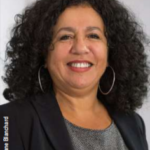“Understanding the impact of our policies on the regions and their inhabitants”
The Département of Loire-Atlantique is involved in promoting sport for all, in particular for persons with a disability. The department decided to measure the impact of its activities in this area, as Malika Tararbit, Vice-president in charge of sport and outdoor activities, explains.
 Malika TARARBIT
Malika TARARBIT
Vice-president in charge of sport and outdoor activities
What is your department doing for disability sport?
MT: Departments have direct legal responsibilities regarding disability, but only voluntary, shared powers for sport. So including sport in all our departmental policies is a daring step and a sign of our commitment. In the field of disability, we are working in collaboration with disability and adapted sport committees and dealing with all kinds of disability (motor, sensory, psychological and intellectual). Our aim is to lean towards full inclusion. This is a way of achieving a real society for every person, with and without a disability. We act on several levels, mainly through the 44 sports instructors who make up our service dedicated to sport. This service is specific to our administration, and it enables us to undertake a number of schemes.
What do your services offer in concrete terms?
MT: We have already trained our instructors. Inclusion doesn’t happen by itself. It was important to give them the tools to bring it about. We also created what we call “adapted multisport schools”, first in the town of Vallet and then in Rezé. Others will be opened in the Ancenis and Saint-Nazaire areas. We aim to cover the whole region. These schools offer activities for children and young people with a psychological or intellectual disability, near the towns, clubs and committees they work with. Families and medical-social establishments and services are also involved. Our instructors initiate an approach and create the conditions for regular, adapted participation, keeping clubs involved. In Vallet, for example, we started with 5 kids and there are now 20. The feedback has been very positive. Another of our schemes concerns making outdoor spaces, sites and trails accessible, a competence conferred on the department. Five rambling circuits are now accessible. We also help clubs to buy equipment and run events, such as the “Casquettes et Crampons” event which brought together 800 participants.
You have decided to measure the impact of some of your schemes, with the help of Sport and Citizenship. What do you expect from this study, which is currently in progress?
MT: The aim is to have objective data and understand the effects of our policies, their impact on the region and its inhabitants. In this case we want to know how the people involved understand questions of inclusion through sport, and how the department can play a role as initiator and facilitator. When we change the living environment, this has an impact on the inhabitants and their ideas. We also need to know how our schemes are perceived and used, and in what way they are useful. We want more precise knowledge of who has access to them and of how to approach host structures to get them more involved. Inclusion is not just a good intention, it is a constant requirement for social progress for each person.







 INSCRIPTION
INSCRIPTION CONTACT
CONTACT FACEBOOK
FACEBOOK